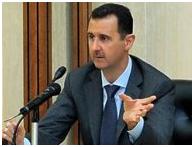Syrian Arab News Agency (SANA) shows embattled Syrian President Bashar al-Assad. (AFP …
President Barack Obama called on Syria's Bashar al-Assad to leave power Thursday, as the United States announced new sanctions on the Syrian regime, which is accused of killing some 2,000 people in six months of anti-government unrest.
"The future of Syria must be determined by its people, but President Bashar al-Assad is standing in their way," Obama said in a statement released by the White House Thursday morning. "His calls for dialogue and reform have rung hollow while he is imprisoning, torturing, and slaughtering his own people."
"For the sake of the Syrian people, the time has come for President Assad to step aside," Obama's statement continued.
"The transition to democracy in Syria has begun, and it's time for Assad to get out of the way," Secretary of State Hillary Clinton echoed in an on-camera statement at the State Department shortly after the White House announcement, which you can see in the video below.
The U.S. call for Assad's exit--which was immediately followed by a chorus of similar declarations from the leaders of Canada, the United Kingdom, France, Germany and the European Union foreign policy chief--stressed that the United States does not plan for any sort of international military intervention in Syria--on the order of the NATO-led action to aid rebel forces seeking to oust Libya's Muammar Gadhafi.
"The United States cannot and will not impose this transition upon Syria," Obama said. "It is up to the Syrian people to choose their own leaders, and we have heard their strong desire that there not be foreign intervention in their movement."
The call for Assad to step down came as a United Nations human rights team announced in Geneva Thursday that it had determined the Syrian regime may have committed war crimes in its brutal crackdown on anti-government unrest. The UN panel said it may recommend the referral of Syria to the International Criminal Court in the Hague. The Security Council is also scheduled to discuss Syria Thursday afternoon.
The Obama administration also announced a new, fifth round of sanctions on Syria Thursday. The new sanctions prohibit U.S. persons from having any financial dealings with the Syrian regime and in particular with Syria's petroleum industry, and called on other countries to follow the U.S. action. The European Union receives some 90 percent of Syria's petroleum exports, analysts estimate, and the United States has been pressing European allies to curtail their Syrian energy imports to further financially choke off and pressure the Damascus regime.
Today's sanctions are "in part symbolic and in part significant," Douglas Jacobson, an attorney who specializes in international trade law, told the Envoy, noting that the U.S. "imports more petroleum products from Trinidad & Tobago than it does from Syria." Symbolically, however, Jacobson added, the further U.S. sanctions put Syria in the unwelcome category of such shunned regimes as those of Iran, Cuba and Sudan.
U.S. officials said that while they now assess that Assad is on the way out, they cautioned that his toppling may neither be swift nor easy.
"We can't predict how long this will take, and it's not likely to be easy," one senior U.S. diplomat told journalists in a call organized by the White House Thursday to explain the escalation of coordinated international actions on Syria. "But we are certain Assad is on the way out, and we are certain his isolation will increase."
"Syria is in effect emerging from forty years of an induced coma," the senior official continued, referring to the four decade reign of Bashar al-Assad and his father Hafez al-Assad before him. "People are not afraid any more, and that is when regimes start to crumble."












